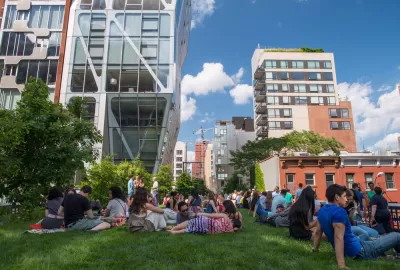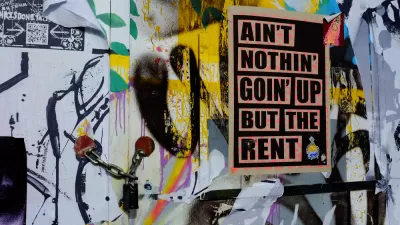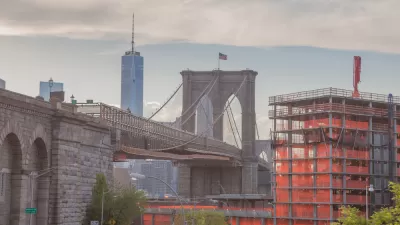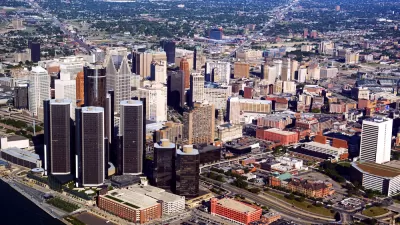A PBS NewsHour two-fer: an interview of urbanologist Richard Florida conducted in a walking tour of New York's famed High Line in the gentrifying West Chelsea neighborhood, a fitting backdrop for his new book, "The New Urban Crisis."

Economics correspondent Paul Solman interviews Richard Florida in this nine-minute report for the PBS NewsHour. Scenes along, below, and above the High Line are captivating and illustrative of the gentrification theme of Florida's new book, The New Urban Crisis. Both speakers share their knowledge of the rich history of West Chelsea and former rail line.
[Or click on the video "Has urban revival caused a crisis of success?"]
"Once they built the [High Line] park [in 2009], it became a draw, not of people, but for real estate developers," explains Florida. "And they never anticipated that. No one anticipated the High Line would be a place that luxury towers would grow up around."
If the old urban crisis was about the middle-class flight from the city to the suburbs, the new urban crisis is about really the disappearance of middle-class neighborhoods from our society.
Solman provides the context for Florida's new book, which is a successor to his first book, "The Rise of the Creative Class," published in 2002. "But what Florida now sees is the double edge of the advice he gave, and that so many followed." Florida explains:
A bigger, denser city in general increases the rate of innovation, increases the rate of start-up, increases the rate of productivity. At the same time, the bigger, the denser, the more knowledge-intensive increases the rate of inequality, increases the rate of economic segregation, makes housing less affordable. So it’s a two-sided monster.
Solman explains there are in fact two urban divides: one within cities between "the rich and the rest," and the interurban divide: "winner-take-all urbanism, the winners, San Francisco, New York, the losers, cities like Detroit, Milwaukee, Memphis."
Public transit
Can an efficient subway "close the gap," enabling workers less wealthy workers to live further away?
The video takes a detour to both ends of the #7 IRT subway, the Flushing terminal in Queens, and the first new subway station to open in New York since 1989, the Hudson Yards terminal at 34st Street.

The ultimate solution, though, rests with inclusionary zoning, asserts Florida.
If you want to build a tower like that [pointing to a high-rise], if you want to get the rights to create height and density, we’re going to make a trade. And the trade we’re going to make, in order for you to go up like that, you’re going to make affordable housing.=================
Related reading
- PBS: Column: ‘The New Urban Crisis’ is a crisis of capitalism, writ large," by Richard Florida, June 2, 2017
-
PBS: Making Sen$e: "Is the ‘creative class’ saving our cities, or making them impossible to live in?" by Paul Solman, June 1, 2017: Questions that weren't asked in the NewsHour segment above.
- Architectural Record: Book Review of "The New Urban Crisis" by James S. Russell, June 1, 2017.
- Planetizen: "As Cities Have Changed, So Have Richard Florida's Ideas", October 25, 2016: An early review of the ideas behind, including the genesis of, "The New Urban Crisis."
FULL STORY: Has urban revival caused a crisis of success?

Study: Maui’s Plan to Convert Vacation Rentals to Long-Term Housing Could Cause Nearly $1 Billion Economic Loss
The plan would reduce visitor accommodation by 25,% resulting in 1,900 jobs lost.

North Texas Transit Leaders Tout Benefits of TOD for Growing Region
At a summit focused on transit-oriented development, policymakers discussed how North Texas’ expanded light rail system can serve as a tool for economic growth.

Using Old Oil and Gas Wells for Green Energy Storage
Penn State researchers have found that repurposing abandoned oil and gas wells for geothermal-assisted compressed-air energy storage can boost efficiency, reduce environmental risks, and support clean energy and job transitions.

How Madison’s Tree Planting Efforts Are Growing a Healthier Community
Madison’s annual tree planting initiative is enhancing environmental resilience, public health, and community livability by adding 1,400 carefully selected trees citywide, with strong community and institutional support for urban forestry.

Texas State Bills Could Kill Transit Funding in Dallas, Austin
State lawmakers could pull funding from the state’s largest transit agency and the ambitious Project Connect, a voter-approved transit project in Austin.

Opinion: DC Encampment Sweeps Hide, but Don’t Solve, Homelessness
President Trump recently ordered the clearing of encampments built by unhoused people on federal land in Washington, D.C.
Urban Design for Planners 1: Software Tools
This six-course series explores essential urban design concepts using open source software and equips planners with the tools they need to participate fully in the urban design process.
Planning for Universal Design
Learn the tools for implementing Universal Design in planning regulations.
Ascent Environmental
Borough of Carlisle
Institute for Housing and Urban Development Studies (IHS)
City of Grandview
Harvard GSD Executive Education
Toledo-Lucas County Plan Commissions
Salt Lake City
NYU Wagner Graduate School of Public Service





























